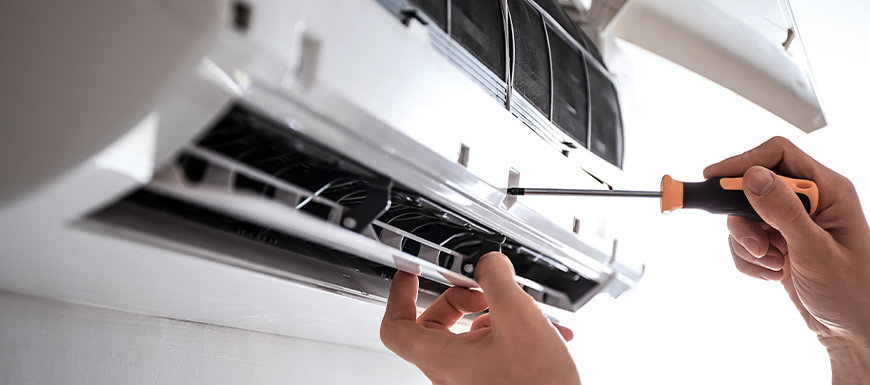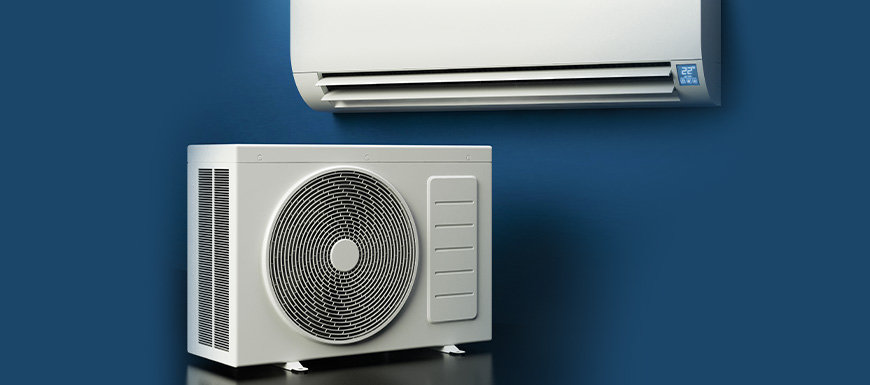
It gets “Hot in the city, hot in the city tonight….” That’s right Ontario summers are hot, and you want an AC system that’s dependable, fully functional and keeps your house cool. Last summer 2022 was the third warmest Canadian summer ever, surpassed only by 2012 and 1998!
Most air conditioners will last 15 - 20 years in our region. Even though these units are built tough and designed to last, you can have other “fixable” issues arise over the course of your AC’s lifetime. You know your AC needs replacing when the compressor fails, or the condenser develops significant corrosion and leaks. Until then, here are nine of the most common issues people have with their air conditioners.
First, what is refrigerant and why is this issue leading the list? Every AC unit functions on refrigerant. It helps absorb the heat from the air passing through the air conditioner. The heat transfers outside your home and the cool air gets pumped back inside. If your AC is leaking refrigerant, you have a fundamental problem on multiple fronts, making this one of the most critical issues to identity and fix immediately.
There are two main types of refrigerants used in AC units. Traditionally it was Freon, but research has shown it to be very toxic and damaging to the environment. So much so that as of January 2020 Canada banned the sale of Freon. All new AC units manufactured must use a new refrigerant called Puron, demonstrated to be better for the environment.
If you have a leak of either refrigerant you must call a technician immediately, as they pose both environmental and human health risks. It’s not easy to detect most refrigerant leaks, because they often appear in coolant lines, out of sight. But you can be on the watch for these signs:
If your AC is blowing out warm air or has low airflow this could indicate a refrigerant leak or low refrigerant pressure.
If your electricity bills are a lot higher than normal. If your AC unit is low on refrigerant it will have to work much harder to cool the air, using up more energy and costing you more.
If your AC is noisier than usual. Especially if the sounds are bubbling or gurgling. This could mean there is leaking refrigerant somewhere along the process inside your unit.
If you notice brightly coloured stains on the ground outside near your air conditioner.
If a member of your household is unwell, with symptoms of dizziness, nausea or difficulty breathing. Refrigerant released into the air can cause these symptoms. It’s important to seek medical care immediately.
Low refrigerant levels can cause coil freezing and severely damage the compressor. If you suspect a leak there is only one thing to do; call a reliable HVAC company, like Advance Heating and Cooling, and have a professional fix the leak, assess the unit and charge the system with the right amount of refrigerant. Otherwise, you’ll be replacing your entire system very soon.

Regular inspections and preventative maintenance can improve the longevity of your AC system. In fact, qualified technicians are your best bet to identify a refrigerant leak before its too late.
It’s important to have clean air filters and coils to prevent damage and premature failure of your compressor or fans. Skipping regular maintenance can also put your manufacturer’s warranty at risk. Be sure to change your air filters regularly, every other month during the summer minimum, and schedule an annual servicing.
By their function air conditioning systems turn on and off. You’ve set your thermostat to maintain a certain temperature and a dozen factors can influence it. It’s hotter in the afternoon, someone accidently left a window open, heat escaped from the shower and oven. Regardless the AC will turn on to combat the heat and once it has reached your ideal temperature it will turn off. Or if you’re system is too big for your house it will frequently turn on and off cooling down your house very quickly. This on and off activity can wear out your compressor, fan, and blower motor controls. When this happens, you can have an electric control failure, or a connection problem and your AC won’t turn on.
Faulty circuit breakers or fuses can cause another common electrical problem. This could be due to a poor AC installation, where the wrong circuit breaker or wiring is not rated for the HVAC unit’s output. If you are going to try and change it yourself (not recommended) be sure the system is cool, and the electricity turned off. If you call a technician, they can change the fuse and investigate the cause like a tripped high-pressure limit switch and make the repair.
All air conditioners have a thermostat sensor that measures the temperature in the evaporator coil then adjusts the cooling based on that reading. If the sensor is not in the correct position or touching the coil, the system will shut on and off randomly or stay in a constant running state. Look and see if you can locate the thermostat sensor, then bend the wire that holds it in position and adjust.
Air conditioners produce condensation, and that water must drain. If there is a clogged drain with dust, algae, or dirt or if the unit doesn’t sit level, water cannot drain properly. Stagnant water inside the system can cause mold and mildew to grow and create odour problems entering your home. Drain line inspections are part of a regular maintenance check and can help prevent this problem.
We know an AC’s job is to keep it cool, but it’s not supposed to freeze while doing it. If you notice ice or frost build up on your air conditioner evaporator coils, it’s a problem. Check to make sure your air filter and ductwork are clean. A well functioning AC unit has good air circulation and without it you may get frost build up. Again, this could be related to our #1 problem - low refrigerant, forcing the system to work much harder resulting in freezing coils. Start with that air filter change, and if this doesn’t improve the airflow, you should call in the pros.

“Houston we have a problem,” …the thermostat isn’t working. Your air conditioner relies on the thermostat to provide direction on when to turn on and turn off. When a thermostat is malfunctioning the AC system can go rogue. If your thermostat is being unresponsive to homeowner input, does not adjust to new temperatures or displays the wrong temperature, your AC will continuously, refuse to shut down, or just go on and off randomly. Do some testing with the thermostat, ask a technician to look at if you have an annual maintenance check booked or look to replace. There are a ton of programmable and smart thermostats on the market that will save you energy and money.
An air conditioner shouldn’t smell bad nor produce awful smells to come into your home, especially when all your windows are closed! If you have a strong burning smell it could be wiring issues or a clogged filter causing the unit to overheat. If you’re getting a musty odour, its probably a drainage problem.
An air conditioner shouldn’t make strange noises. We all recognize the normal sounding hum, purring away beside homes on a summer walk. If you start hearing squealing, grinding or strange vibrations, you’ve got a major issue on your hands. Squealing sounds are usually the caused by a worn or poorly aligned belt. Grinding noises are a red flag and are related to the motor bearings in your compressor. Other noises to keep an ear for:
Hissing – produced by a refrigerant leak.
Clicking - when the AC turns on and off can signal a relay problem.
Rattling or banging - can mean the blower or motor assembly.
Screeching – is coming from the compressor or fan motor.
Buzzing – is a sign of faulty electrical components.
Whether your AC is offending your smell or your hearing it’s time to call a technician for help.

A good air conditioner, installed properly and well maintained can last 15-20 years. Many age-related breakdowns or premature “deaths” are caused by poor to non-existent maintenance. Every year that goes by, that doesn’t include regular air filter changes and a little love and care, means the unit is progressively working less efficient. Your energy bills will be higher, the important parts of the system will wear quicker, and the unit will lose valuable years off its lifetime.
Pay attention to your air conditioning system and it will work long and hard to keep your home cool and comfortable for years to come.
